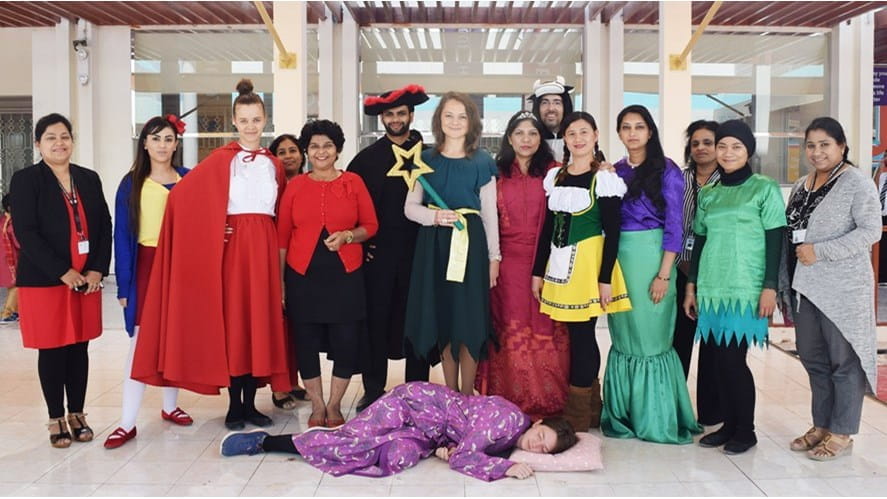We use cookies to improve your online experiences. To learn more and choose your cookies options, please refer to our cookie policy.
Admissions Are Now Open for 2025 - 2026!
Please contact our Admissions team for next steps.

Assessment Week
This busy time of the school year is testing our students’ resilience! Our Year 7 and 8 students finished their Term 2 assessment week on Thursday, and our Year 9 and 10 students are gearing up for their assessment week starting today. With exam preparations and performance came the excitement of Reading Week, World Book Day, the BSME games for some, the NAISAK Award and International Award desert walks for others, and the Tanzania fundraising events for a select few.
Students’ resilience is being tested as they are asked to simultaneously perform on a variety of platforms, be it academic, sporty, extra-curricular or social. As challenging as it may sound, such times in the school year not only contribute to fostering holistic education and help our students develop into well rounded learners and young people, but they also illustrate what adult working life is.
The internet offers an incredible amount of assessment/revision tips, so incredible that not all of them are valid or applicable at the same time. Reading through a variety of well-known website, such as the TES (Times Educational Supplement) or Time, please see below some top assessment week tips :
1-Verify the details: In other words, make sure to read carefully your assessment schedule and the expectations shared with you by your teachers in your Communication Book and posted on Show My Homework.
2-Get some sleep: Last-minute revision the night before is counterproductive. Work hard and regularly throughout the year, then enjoy a good night’s sleep before your assessments so your mental and physical abilities are heightened during exam time. Fatigued brains do not retain information, nor do they recall it well.
3-Stay active: Remember that some fresh air and physical exercise will help your brain work better. Exercise boosts blood flow to the brain, and sitting in one place for an extended period of time can lead to a tired, ill-supplied mind.
4-Eat well: Our Healthy Eating Policy takes even more sense ahead and during assessment weeks. Eat foods that are digested slowly: whole grains, fresh vegetables, and lean proteins. Be well prepared: taking a test while hungry can be a recipe for disaster.
5-Know yourself and your study skills: By now, you should have experimented with a variety of study skills. You know what works for you and what does not. Do not copy your friends blindly: stick to what you know has led you to success in the past. Trialling new methods is welcome of course, but start on a small scale until they are proven to work for you. We are all different!
6-Silence your social media accounts: This seems obvious but some more explanation is needed. The reverse of focusing too intensely is not being able to focus at all. While it is true that devoting too much time to studying can lead to fatigue, dividing your review sessions into too many parts can lead to scattered and ineffectual learning. Turning off your social media for an entire week may not be realistic or achievable for every student. Do, however, consider using it as a reward. Check in on your favourite platforms or websites for 10 to 15 minutes per day or during your downtime. However, be aware of the “just for a moment” syndrome. As most people know all too well, checking news headlines can lead to an entire afternoon of watching hilarious cat videos and reading gossip.
With all this mind (the challenges but also the techniques to face them), let us not forget that assessment weeks are also the opportunity for students to demonstrate their knowledge, understanding and skills, and for schools to celebrate achievement and attainment.
World Book Day
World Book Day was celebrated across the globe on Thursday 01 March 2018. NAISAK was no exception; in fact, we went one step further and spent a whole week celebrating. Such is our love of books!
Throughout the week, many class-pairing reading activities took place. ‘Share a Story’ and ‘Reading Buddies’ saw Secondary and Primary students pair up to enjoy reading to one another. Every single Primary student who participated in Reading Buddies got a thumbs-up from their Secondary buddy and a well-deserved treat. This initiative was created by the Secondary English Department, to showcase reading as something both educational AND great fun.
Our other World Book Day celebrations included:
Some UK-based statistical food for thought:
A student who reads for 20 minutes each day totals 3600 minutes in a school year. That is 1,800,000 words! Such students are in the 90th percentile.
A student who reads for 5 minutes each day totals 900 minutes in a school year. That is 282,000 words. Such students are in the 50th percentile.
A student who reads for 1 minute each day totals 180 minutes in a school. That is 8,000 words. Such students are in the 10th percentile.